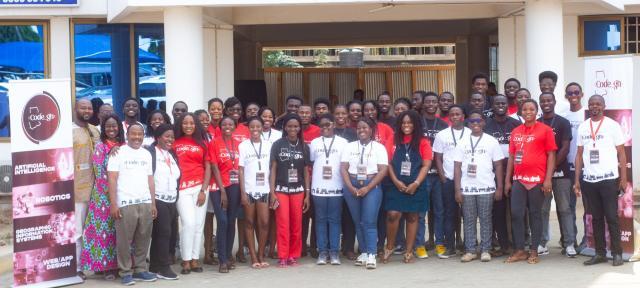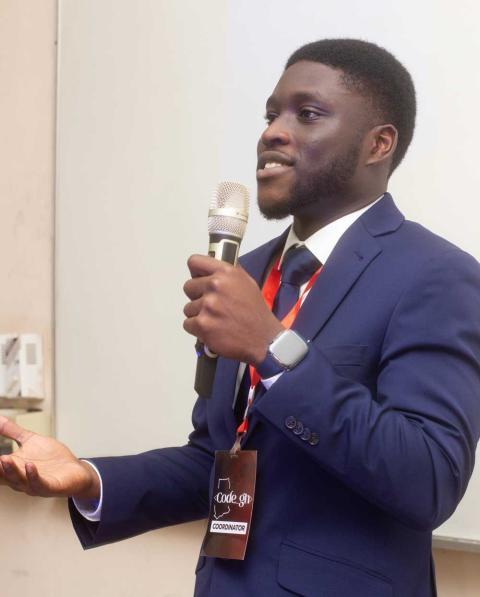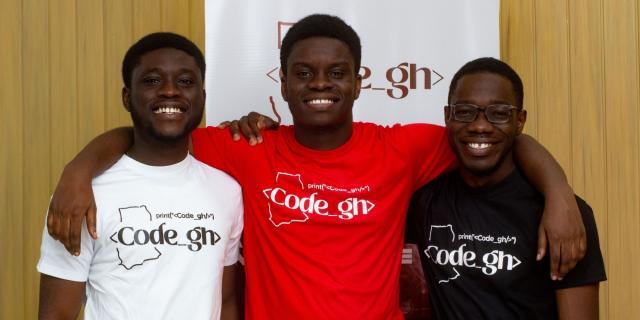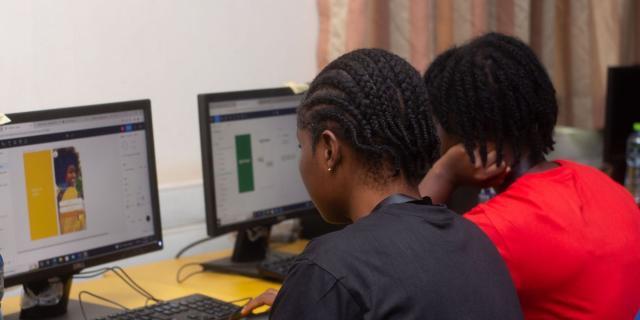Hampshire Student Implements Tech Exploration Program for High School Students in Ghana

Projects for Peace grant recipient Rupert Tawiah-Quashie 22S and his two teammates traveled to Accra, Ghana, this summer to run a nine-day tech boot camp for high school students.
We spoke with Hampshire College student Rupert Tawiah-Quashie at the start of 2022 when his team was first awarded one of Middlebury College’s prestigious $10,000 Projects for Peace grants for their program “<Code_gh>.” Rupert worked with team members Kevin Ntoni, a student at Middlebury College focusing on economics and math, and Nathaniel Wullar, a computer science and electrical and computer engineering student from Duke University, to develop the program aimed at exposing young Ghanaians to employment opportunities in technology.
Recently, we had the opportunity to reconnect with Rupert, who’s returned to Hampshire for the fall semester. In our conversation he discussed his time in Accra, the implementation of “<Code_gh>,” and the impact it had on his team and the community they worked with.

How did tech boot camp go?
The program ran from August 16 through 26. In total, we were expecting 30 students maximum. On the first day, we had 15. By the end of the third day, the number had increased to 28, and, on the last day, we had grown to about 50 participants.
We had a wide variety of experts assisting with the program. These included cybersecurity engineers, tech founders and CEOs, artificial intelligence (AI) engineers and architects, and experts in sustainable energy, programming, and e-commerce, among others.
How was your experience implementing “<Code_gh>?”
In all honesty, at the start of the program, I did not know what to expect. I just kept on praying to God that everything would go as planned. We were very fortunate in that we had a lot of support from our parents, the participants, professors, IT technicians, and more. Our participants were dedicated and enthusiastic, which made all the difference. We were not only encouraged by their willingness to learn, but also dumbstruck by their ideas and subsequent personal projects. They came back every day with renewed excitement, more eager than the day before.
Though it took us countless Zoom calls, emails, four-hour rides to and from the venue, and months of planning and re-planning, the program was more than worth it. It was successful not just because of the attendance or the quality of lectures, but because of the testimonies from the parents of our participants and the projects they were able to develop.
If you ask me whether I would like to do this one more time my answer would be no. Why? Because I would like to do this ten, eleven, or even twelve more times.
At Hampshire, I’ve found a community of “darers” with thought-provoking ideas on how to impact change through technology, art, science, music, writing—you name it—and a faculty who listens to these ideas and says “let's make it happen.”Rupert Tawiah-Quashie 22S
Were there any particularly powerful experiences with students in the program?
On the first day, we gave the students the opportunity to state their goals and expectations for “<Code_gh>.” Almost 75% expressed their interest in artificial intelligence, which was my area to lead. I was nervous, to say the least. I was hoping our lecture and demonstrations would be able to meet their enthusiasm for the subject. At the end of our time, the feedback I received was eye-watering. Students were asking: “When are we having another AI session? Can I be your mentee? How can I become a self-taught AI engineer?” It was in those moments that I knew we’d achieved our goal. We were exposing these students to various fields in tech and providing them with resources on how to build upon these interests and skills after the program concluded. I was deeply grateful that we were able to make a positive contribution to the futures of our participants.
In the words of my collaborator Kevin, “there are so many people who yearn for opportunities that many of us living in the United States take for granted. Hard-working and talented students are prevalent all over the world, but there is no platform for a large percentage of them to hone their skills and use those skills to their advantage. “<Code_gh>” made me realize that there is so much fulfillment in using your resources to help others in an impactful way.
Did your time at Hampshire last semester (your first) influence your approach to the program this summer?
Last semester, I worked on an independent study in machine learning with Professor Davila. The knowledge I gained was immensely beneficial to me and the participants of the program when I taught my AI lectures. Additionally, the Hampshire students, alums, and faculty I spoke with about the program gave me insightful and astute suggestions on how best we could make the program work.
At Hampshire, I’ve found a community of “darers” with thought-provoking ideas on how to impact change through technology, art, science, music, writing—you name it—and a faculty who listens to these ideas and says “let's make it happen.”





